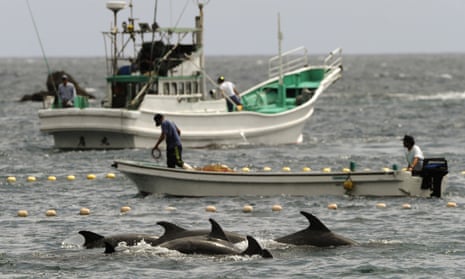Japan’s aquariums are to decide whether to stop buying live dolphins from the town of Taiji, where hundreds of the animals are slaughtered every year, or else face expulsion from the world’s leading zoo organisation.
Weeks after it was suspended in a unanimous vote by the World Association of Zoos and Aquariums (Waza) for continuing the “unethical” procurement of dolphins from Taiji, the Japan Association of Zoos and Aquariums (Jaza) is to poll all 152 of its organisations on membership of the global body on Wednesday.
The Jaza vote, among 89 zoos and 63 aquariums, will come a day before the deadline to end what Waza calls the inhumane procurement of Taiji dolphins. Failure to do so would result in Jaza’s immediate expulsion from the world association next Thursday.
A yes vote would effectively mean Japanese aquariums ending the practice of buying live dolphins from Taiji, whose drive hunt has been condemned by environmental activists and the US ambassador to Tokyo, Caroline Kennedy.
Most of the animals captured during the hunts are butchered for their meat, but a small number are sold to aquariums and sea parks in Japan and overseas.
A no vote would enable Jaza to continue using Taiji dolphins, but would result in its immediate expulsion from the global organisation, a move that would threaten Japan’s ability to acquire rare animal species from zoos and aquariums overseas.
The Swiss-based Waza suspended its Japanese members on 22 April after they ignored requests to stop acquiring dolphins, almost all of them bottlenoses, from the Taiji drive hunt. The town, on Japan’s Pacific coast, supplies about 20 dolphins a year to Jaza aquariums.
On Wednesday, Yoshinobu Nisaka, the governor of Wakayama prefecture, where Taiji is located, said the suspension amounted to “bullying from all over the world”.
The suspension came soon after the Guardian revealed that Waza had been targeted in a court action launched by Australia for Dolphins. The group accused it of being complicit in the infamous Taiji dolphin hunts, in which animals are forced into shallow waters and some slaughtered, by failing to take decisive action against Japanese aquariums.
The Taiji drive hunts gained notoriety through the Oscar-winning 2009 documentary The Cove. Jaza rejected a Waza proposal last August for a two-year moratorium on the practice.
In an attempt to avoid accusations that it is soft on animal welfare, Waza has given Jaza until next Thursday to stop procuring cetaceans from Taiji or be expelled from the global organisation. It issued the threat even after Jaza had started procuring only dolphins that are caught separately from the lethal hunts – an approach Japanese officials claim is more humane.
“We are puzzled at the Waza announcement, because we’ve been discussing the issues and we’ve taken Waza’s advice” on improving capture methods, Kensho Nagai, Jaza’s executive director, told AFP. “We annually take about 20 dolphins from Taiji, but we have improved how we hunt, separating our hunt from everything else at Taiji that is for dolphin meat.”
Jaza’s chairman, Kazutoshi Arai, confirmed that the procurement of Taiji dolphins by Jaza aquariums was closely linked to the vote on membership of Waza.
In an interview with the Guardian before Jaza’s suspension, Arai said expulsion from Waza would be a big problem for Japanese zoos, as it would deny them access to a global database of rare species. Aquariums, too, would struggle to secure cetacean species not indigenous to Japanese waters.
On the other hand, if they agreed to stay in Waza and cut their ties with Taiji, Japanese aquariums would have to dramatically expand expensive breeding programmes.
“The breeding rate for dolphins is much lower in Japan than in the United States,” Arai said. “Our aquariums want to acquire as many dolphins as they need for educational purposes, and if we were able to breed enough then we wouldn’t need to catch them in the wild. But unfortunately Japan’s dolphin breeding capacity is still very low.
“Being expelled from Waza would be a big problem, especially for zoos. Jaza is a large organisation and must remain under the Waza umbrella. Being part of Waza is good for everyone so we should do everything we can to avoid [expulsion].”
According to Jaza, about half its member aquariums keep dolphins, a hugely popular attraction among visitors.
The capture of dolphins is said to have doubled in the past 10 years. A fully trained dolphin on public display can be worth more than $100,000 (£62,000), compared with as little as $100 if butchered for meat. Anti-hunt campaigners say the market for captured dolphins in China is growing rapidly.
Over the past five years, observers say, more than 5,000 dolphins have been killed at Taiji, with a further 750 captured for aquariums. Since August 2014, 751 dolphins have been killed, with 41 bottlenose dolphins captured.
Waza has more than 20 associate members, including Jaza and the European Association of Zoos and Aquaria, as well as 300 individual zoo members, including London Zoo, Bronx Zoo and Melbourne Zoo.
